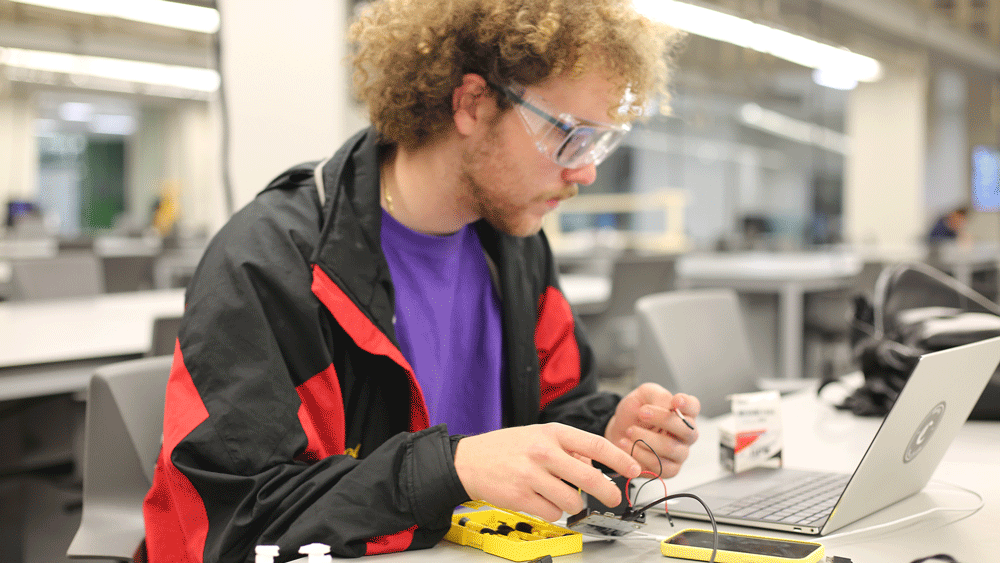
The fourth annual Invent for the Planet (IFTP), a global 48-hour design competition hosted by Texas A&M University, saw more than 400 students from 22 universities around the world collaborate to solve global issues. Kicking off on Feb. 18 in the afternoon locally, students spent the next two days forming a team, developing a plan and prototyping and pitching to a panel of local judges.
In March, a panel of international judges will virtually select the top five teams from the first-place teams worldwide. Those teams will travel to Texas A&M for a final pitch competition held April 7. The winner will be named the champion of IFTP 2022. Global winners will be awarded $5,000, $3,000 and $2,000 for first, second and third place, respectively.
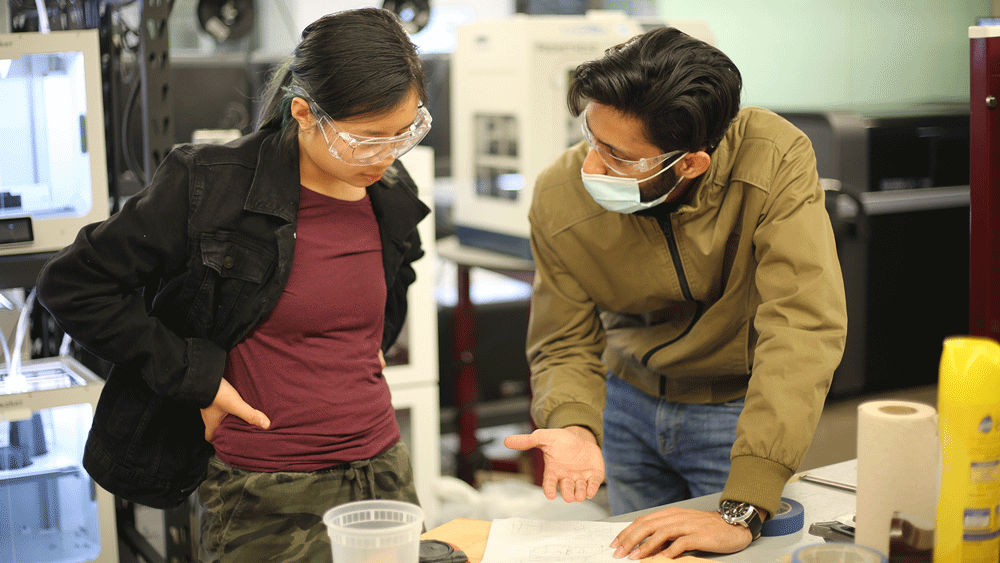
The sun never sets on innovation
International collaboration was highly encouraged and utilized throughout the event. Communicating through the Microsoft Teams environment, students were able to team up with students at other universities, as well as receive mentorship from industry and academia from all over the world.
“It was really interesting to see all the other groups working at the same time, even if it was the morning here and night over there,” said Connor Barnes, member of Just Dew It.
IFTP is a significantly scaled-up version of Aggies Invent, a 48-hour design competition created by Rodney Boehm, director of engineering entrepreneurship at Texas A&M. His goal for these events is to ensure Aggie engineers are exposed to key learning experiences before graduating, like collaboration and innovation of thought.
“The catch-phrase for IFTP is ‘The sun never sets on innovation’ because, for 48 hours, these universities are all innovating around the clock. It’s one of my favorite events as we see the global impact of our effort,” said Boehm. “This is especially true as we emerge from the COVID-19 lockdown. Students were as energetic as before, just as engaged, and developed tremendous solutions to some really difficult problems affecting everyone on the planet. I can’t wait for the global conclusion in April.”
Another goal for IFTP is to give student participants access to industry mentors, who not only share wisdom and their expertise but provide vital contacts and awareness to the unique need statements. Universities around the world had industry members on their campus for support, and there was a team of volunteer mentors and judges available around the world for students to reach out to over Microsoft Teams.
“One of the judges mentioned that there was a company here in Bryan that outsources aquaculture to places in Ghana,” said Sophia Abbasali, member of Aquabox. “He encouraged us to reach out to them to try and test our system to see if it will work.”
The Texas A&M University winners
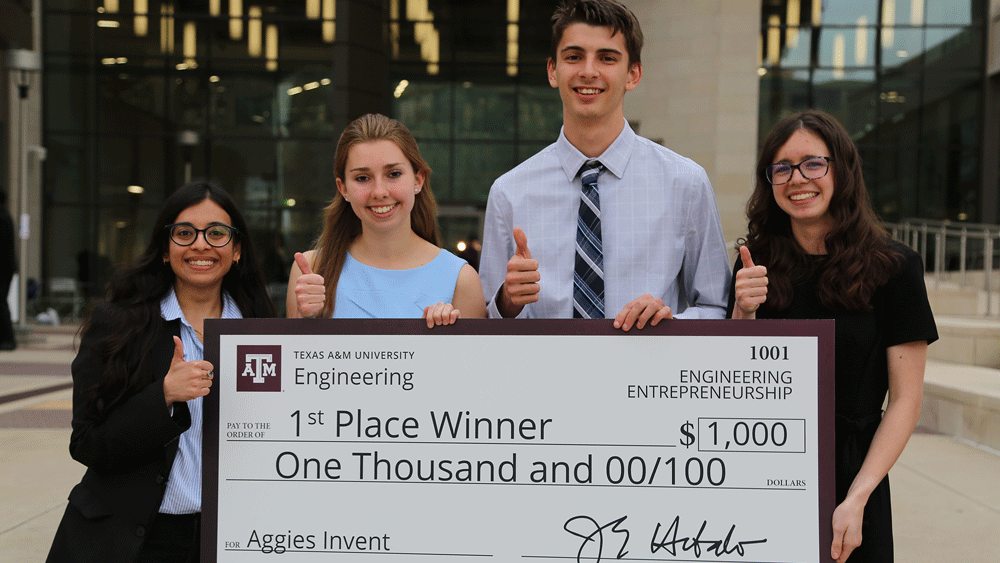
Aquaculture, the process of farming aquatic organisms, is known to be labor intensive and unsustainable in underdeveloped nations. Aquabox, the first-place winners at IFTP 2022, developed an easy-to-use digitalized aquaculture monitoring system specifically for developing countries. Therefore, it was important for them to break language barriers and provide an affordable, accessible and easy system to help increase food production. The Aquabox is placed in a water channel and is powered by solar panels. It has sensors that will notify the farmer about different levels of the water through light patterns and has a user manual that will be provided in a variety of languages to explain those patterns, followed by an action for the farmer to take to fix the problem.
Having a team with diverse academic backgrounds and experiences proved a winning formula for Aquabox. They emphasized relying on using every member to their fullest potential and shared how valuable and experience like Aggies Invent and IFTP can be.
“It helps you work collaboratively with a team and make sure you know how to coordinate with everybody else. Getting on the same page with other people and working toward the same goal can be difficult sometimes. Aggies Invent teaches you how to do that,” said Devon Reber, member of Aquabox.
Aquabox:
- Rachel Simms, engineering freshman
- Devon Reber, engineering freshman
- Natalie New, chemical engineering, biochemistry sophomore
- Sophia Abbasali, Health Policy and Management graduate student
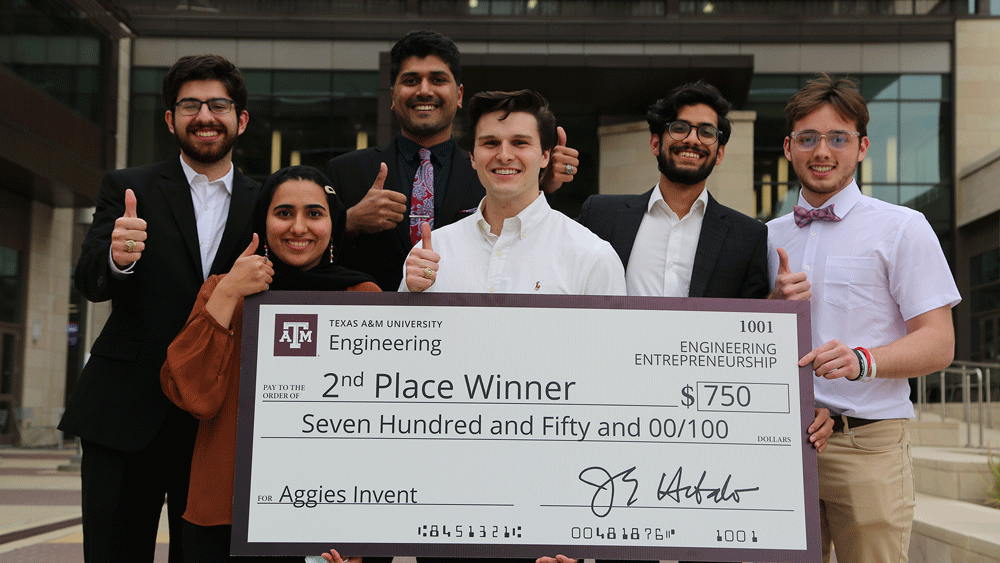
When natural disasters such as hurricanes, landslides and floods occur, clean drinkable water is one of the most difficult necessities to supply, even in metropolitan areas with large supply chains. Just Dew It placed second for their creation, the dewDrop. This easy-to-assemble system consistently captures clean water from the air, no matter the location.
“A lot of effort (at IFTP) is going into solving problems faced by a large portion of the world. It increases the connection between academia and industry. Industry can then take the solutions and scale it up and take it to (those) who are in need,” said Muhammad Ali, member of Just Dew It.
The system implements six layers of polyethylene umbrella-shaped sheets that are meant to capture and filter the water as it goes into a bucket beneath it. Every morning, dewDrop users will have an average of 8-12 liters of clean and drinkable water, solving one of the largest issues experienced from natural disasters.
“I really enjoyed this weekend, just to be able to come together as a team. None of us knew each other going into this, and we’re all from different disciplines of engineering, yet we were able to come up with a common solution. I think, for me, it was a great experience overall, and it gave me a lot of confidence to be able to work with any team, going into industry, no matter what the challenge is,” said Jack Jernigan, member of Just Dew It.
Just Dew it:
- Nathan Hill, engineering freshman
- Muhammed Tai, mechanical engineering senior
- Muhammed Ali, civil engineering graduate student
- Aimen Ahsan Hafeez, mechanical engineering freshman
- Connor Barnes, interdisciplinary engineering junior
- Jack Jernigan, industrial engineering senior
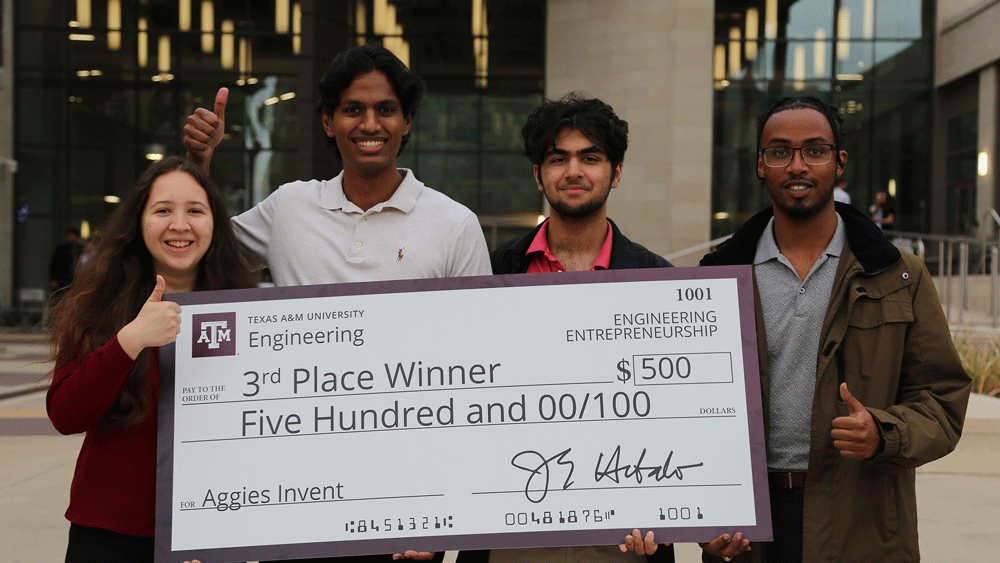
Every year, over 560 million tons of food is wasted globally, with the demographic of 18-35 years of age being the main culprits. Foodle, the third-place team, created a community-based app that allows those who live in apartments to give and receive food through communication. The team members sought to tackle their need statement from the perspective of their education and backgrounds, coming together for one unique solution to wasted food.
“I saw this as a consumer problem, and as a software engineer, I felt like software had a huge ability to be a consumer product,” said Nathan Reddy, a member of Foodle. “That’s how I could apply my skills on the team.”
If the user wants to give food, they can either list it on the app or put it in the Foodle box that has a live stream camera attached at a designated drop-off location. If users want to receive food, they would simply request on the app, check the live stream or physically go to the box to check available foods. By doing so, Foodle will prevent excessive food waste and build a better sense of community.
“I saw this issue more as a distribution problem than a quantity problem,” said Embibel “Bebo” Amenu, a member of Foodle. “I feel like there is enough food in this world, but the more developed countries hoard it all and don’t have a smart system to expand. Living in America would be a perfect place to solve and test this, helping less-fortunate and developed countries get the food they should be able to obtain.”
Foodle:
- Carolyn Nguyen, computer science senior
- Nathan Reddy, computer science senior
- Embibel Amenu, mechanical engineering senior
- Samarth Pahwa, engineering freshman
“Many thanks go out to the sponsors of this event, Chevron, Grass Roots and DesignSpark,” said Boehm. “With industry support like these partnerships, students can continue to benefit tremendously from impactful opportunities.”